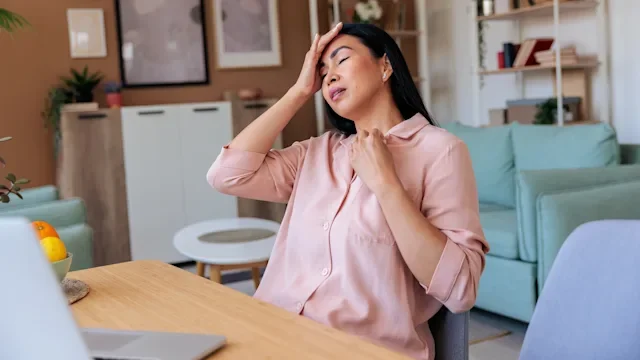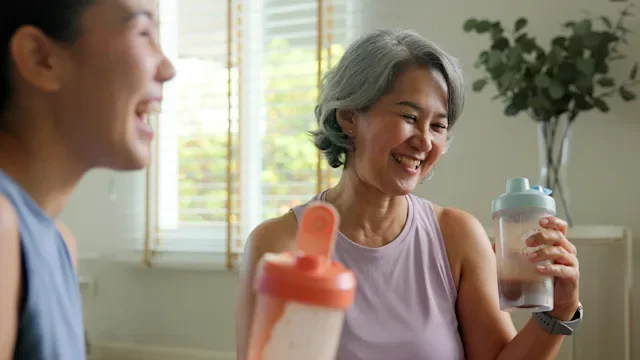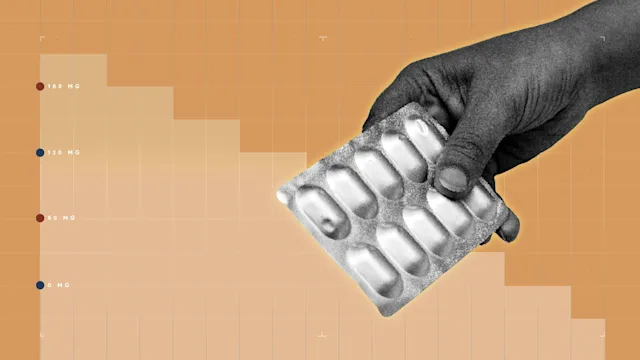Key takeaways:
Menopause can cause many symptoms, like hot flashes, mood swings, and trouble sleeping.
Mind-body treatments can be helpful for managing menopause symptoms.
Mind-body treatments for menopause relief include yoga, relaxation exercises, cognitive behavioral therapy (CBT), hypnosis, and more.
Menopause is the time in your life when menstruation stops. Most of the time, it’s a normal part of getting older. But menopause can cause uncomfortable symptoms, too, including:
For many people, menopause symptoms are mild and go away on their own. But for others, they can be disruptive.
Though hormone replacement therapy (HRT) works well for menopause symptoms, it’s normal to look for other options. In fact, about 1 in 2 people use natural supplements and mind-body treatments and during menopause. Over half who try these treatments find them helpful.
Let’s take a closer look at some of the top mind-body therapies that can help with menopause symptoms. Some you can do on your own at home, while others involve working with a trained professional. And as with any treatment, be sure to talk to your primary care provider or your gynecologist before starting any new practices.
1. Cognitive behavioral therapy (CBT)
CBT is a type of psychotherapy that focuses on your thoughts, behaviors, and actions. It’s used to treat many different physical and mental health conditions — including depression, anxiety, and chronic pain. But there’s also some evidence that it may be helpful for menopause symptoms too.
In a 2024 study that combined and analyzed 30 research studies, CBT was linked to a better quality of life during menopause. CBT also helped with mood, memory, and concentration. There were other types of therapy that helped too (like mindfulness treatments and ACT). But CBT was the most affordable.
Organizations like the North American Menopause Society and the International Menopause Society also recommend CBT for hot flashes and night sweats. And if you’re having trouble sleeping during menopause, CBT for insomnia (CBT-I) is a well-proven treatment.
If you’re interested in trying CBT, one option is to find a therapist to work with you. There are also books and apps for doing CBT on your own. Treatment usually takes 4 weeks.
- Vivelle-DotDotti and Estradiol
- ClimaraEstradiol
- DivigelEstradiol
2. Hypnosis
Hypnosis (hypnotherapy) is a state of deep relaxation and openness. There’s evidence that hypnosis can help with hot flashes, sleep, and sexual function. In some research studies, it even worked as well as prescription medications.
Along with CBT, hypnosis is the only other mind-body treatment recommended by both the North American Menopause Society and the International Menopause Society for hot flashes and night sweats.
And just like CBT, you can either do hypnosis with a hypnotherapy professional, or do the program on your own with the Evia app. Either way, the program takes 5 weeks.
3. Mindfulness-based stress reduction
Mindfulness-based stress reduction (MBSR) is a mindfulness program that uses acceptance, meditation, and yoga. It’s helpful for many different physical and mental health conditions. And it seems to have potential for helping with menopause symptoms too.
In one small study, people who learned MSBR had a much better quality of life during menopause. The International Menopause Society also suggests it might help be worth trying for hot flashes and night sweats. And MBSR is good for cutting down on stress and anxiety, which can also be a problem for some people during menopause.
Though more research is needed on MBSR, it is generally considered a safe treatment to try. The full nine-lesson program is available online or as a workbook. You can also check with your local hospital or community center: Many offer MBSR classes for free.
4. Relaxation techniques
Relaxation techniques are ways to help your body and mind feel less stress. Examples include breathing exercises, meditation, and progressive muscle relaxation.
There’s evidence that relaxation techniques can be helpful during menopause. Practicing these techniques may help you manage hot flashes when they occur — and make them less bothersome. Using relaxation techniques during menopause can also help you sleep well, stay calm, and keep a balanced mood.
Relaxation exercises are typically used in the treatments we mentioned above: CBT, hypnosis, and MBSR. But you can practice them on your own too. Books, websites, and apps can all help you learn meditation and other relaxation techniques.
5. Yoga
Yoga is a type of exercise that involves body poses, special breathing, and mindfulness techniques. It has been studied for many different health conditions, including menopause. According to the National Institutes of Health (NIH), yoga is a great way to support your overall health.
So far, it’s not totally clear how well yoga works for menopause symptoms. But this could be because the many different types of yoga make it hard to study.
One area where yoga seems to be the most helpful is with the psychological symptoms of menopause. It may also be able to give your sex life a boost. But in the research so far, it doesn’t seem to help as much with hot flashes, night sweats, or other symptoms.
All the same, yoga is generally considered safe to try. Though more research is needed to determine how well yoga works for menopause symptoms, we do know for sure that yoga has many mental and physical health benefits — whether you are in menopause or not.
Some people choose to work with a teacher or go to a class. You can also find yoga videos online for people of all ages.
6. Sex therapy
Sex therapy is a type of therapy that focuses on your sex life and intimate relationships. It can be helpful for people experiencing pain during sex, low libido, or problems with orgasm — all of which can be a problem during menopause.
If you’re having challenges in your sex life during menopause, it’s a great idea to reach out to your primary care doctor or gynecologist. They can help determine what’s causing your troubles. In some cases, it can also be helpful to work with a sex therapist. A sex therapist is a mental health professional with special training in treating sexual problems.
7. Acupuncture
Acupuncture is a traditional Chinese medicine technique where small needles are inserted into your skin. There’s a small amount of evidence that acupuncture can help with hot flashes and night sweats, but not all studies agree. It also might work for headaches and depression, which can both be a problem during menopause.
Expert guidelines are mixed too. When it comes to hot flashes and night sweats, the International Menopause Society says acupuncture may be worth a try. But the North American Menopause Society does not recommend it.
All the same, acupuncture is generally considered safe as long as you’re working with an experienced professional.
8. Aromatherapy
Aromatherapy is the use of essential oils to help with how your body and mind feel. Aromatherapy might be useful for reducing anxiety and helping your body relax. And both of these effects can help some people during menopause.
But there haven’t been many studies specifically looking at aromatherapy for menopause symptoms. Some small studies suggest aromatherapy may have a role. For example, lavender oil cut down on hot flashes by 50% compared with fake treatment in one small study. And in other studies, adding aromatherapy to a massage worked better to relieve menopause symptoms like hot flashes and depression than the massage alone.
Though there’s not enough evidence yet to say for sure whether aromatherapy works, it could be an enjoyable option to try.
Can vitamins or supplements also help?
Possibly. There are many vitamins and supplements that claim to be helpful for menopause symptoms. But the truth is, they don’t always work very well. Some dietary supplements may be more helpful than others for certain people during menopause.
Depending on your symptoms, options might include:
Black cohosh
St. John’s wort
Probiotics
Omega-3 fatty acids
L-theanine
But supplements can have side effects of their own. And they can interfere with other prescription medications you take. So, it’s always a good idea to check in with your care team before you start one. They can help you understand how to find an effective, safe supplement that’s a good match for your symptoms.
The bottom line
Menopause can cause many different symptoms, like hot flashes, mood swings, and trouble sleeping. If you’re looking for non-hormonal treatments, mind-body therapies may be able to help. Options include hypnosis, CBT, yoga, relaxation exercises, and more.

Why trust our experts?


References
Baber, R. J., et al. (2016). 2016 IMS Recommendations on women’s midlife health and menopause hormone therapy. Climacteric.
Cramer, H., et al. (2012). Effectiveness of yoga for menopausal symptoms: A systematic review and meta-analysis of randomized controlled trials. Evidence-Based Complementary and Alternative Medicine.
Hunter, M., et al. (2023). Cognitive behaviour therapy (CBT) for menopausal symptoms. British Menopause Society.
Johnson, A., et al. (2019). Complementary and alternative medicine for menopause. Journal of Evidence-Based Integrative Medicine.
MedlinePlus. (2022). Relaxation techniques for stress.
National Center for Complementary and Integrative Health. (2017). Menopausal symptoms: In depth.
National Center for Complementary and Integrative Health. (2017). Mind and body practices.
National Center for Complementary and Integrative Health. (2022). Acupuncture: What you need to know.
National Center for Complementary and Integrative Health. (2023). Yoga: What you need to know.
Shufelt, C. L., et al. (2023). The 2023 nonhormone therapy position statement of The North American Menopause Society. Menopause.
Spector, A., et al. (2024). The effectiveness of psychosocial interventions on non-physiological symptoms of menopause: A systematic review and meta-analysis. Journal of Affective Disorders.
The North American Menopause Society. (n.d.). Effective treatments for sexual problems.
The North American Menopause Society. (n.d.). Depression & menopause.
The North American Menopause Society. (n.d.). Headaches.
The North American Menopause Society. (n.d.). What you should know about relaxation techniques for hot flashes.
The North American Menopause Society. (n.d.). Yoga, kegel exercises, pelvic floor physical therapy.
Wong, S. Y. S., et al. (2018). The safety of mindfulness-based interventions: A systematic review of randomized controlled trials. Mindfulness.














